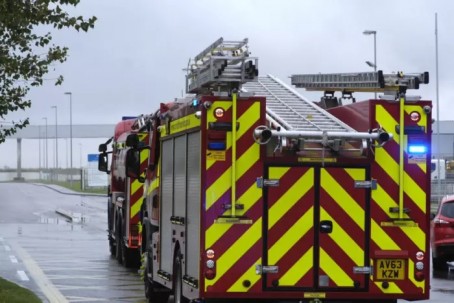A fire service has backed down after “several weeks” of refusing to tell regional daily journalists the names of roads where blazes had happened.
The Eastern Daily Press says its reporters faced a battle with Norfolk Fire and Rescue Service to obtain basic details while making routine calls.
It is understood the service’s control centre had enacted the policy because making road names public “could potentially identify the property involved”.
However, EDP editor David Powles says the issue has now been resolved following talks with the service.

On Thursday, prior to the resolution, David posted a series of tweets sharing his frustration at the situation.
He wrote: “Any fellow journalists who follow me suddenly having issues getting details for where fires are as part of routine calls?
“Several weeks now where my team being refused road names. Keen to know if this is a national local issue as we’re struggling to get resolved.
“Can’t see any good reason for it and surely telling people where fires are is critical to keeping them safe and away from potential danger?”

Norfolk Fire and Rescue Service has been approached for a comment.





 Follow HTFP on Twitter
Follow HTFP on Twitter
What is the matter with the public service chiefs etc. They have got it into their head to be secretive when any tom, dick and harry will know where a fire took place. I bet you they will come running to the press etc when they want to put out an alert to joe public or to warn householders to be vigilant with fire alarms etc.
Report this comment
News from 999 services is sanitised now.Too often papers just drop in press releases, unedited.
Some remember when you could find the names of people injured in crashes and check on conditions with a couple of phone calls (not e mails) to local contacts.
Coverage was better then.
Report this comment
This desperate need to control information has worsened steadily over a period of years, ironically as more former journalists have joined public sector press offices.
The job no longer sees officers act as conduits for information, rather they have set themselves up as judges of what they believe to be newsworthy, releasing only what they believe to be of interest.
Many also mistakenly believe it to be their duty to be obstructive and a barrier to the facts.
Report this comment
Glad it’s resolved. Reminds me…(puts thumbs in lapels, leans back and thumbs chin…) of how in a previous life (when journalism was only in print, on TV or radio…) one of the ways I assessed an overnight fire report that seemed to be of limited value was via a quick call to the town hall electoral office who happily provided three or four surnames on the relevant road from the electoral register. Why would they do that? The electoral register is a public document, and it’s quicker for them than dealing with a visitor. Then it was straight to the telephone directory and inevitably, in those landline days, some or all of the names were in there. “Good morning Mr Smith…did you happen to see…”. Saved a wasted journey and yet sometimes identified the traditional fire rescue hero or other tale that justified a visit. I think – if memory serves – we would be given the number of the affected property by the fire service and so there was usually no risk of phoning the unfortunates direct.
Now, of course, it’s straight on to social media…sigh….I’ve finished my rusks and milk now, nurse.
Report this comment
Yes user generated content – the situation has got worse. But even outside of public bodies Mr/Mrs Joe Public seem to think they should control what goes into a paper. Yet at the same time they are quite content to put what they believe to be “the news” or “truth” onto social media.
Report this comment
Kevin nails it. Perhaps that’s what is missing. Reporters who know what to include in a story and what to leave out.
Report this comment
Wordsmith is right; any Tom, Dick or Harry will know where a fire happens.
Except journalists, whose job used to be to develop local contacts who would supply them with exactly that sort of information.
Now they sit in a shed on some industrial estate on the edge of nowhere, or at a kitchen table in their bedsit, trawling through Facebook in the hope someone’s mentioned something newsworthy on there that they can steal for the website, illiterate quotes and all.
They are at the mercy of government bodies, which control the flow of information as never before because journalists, so-called, no longer have the time, the training or the talent to find things out for themselves.
Report this comment
The truth is press officers do not trust reporters because so many of them lack experience and judgement, the old hands having mostly jumped ship or been sacked. Cops and firefighters would often give off the record info that saved hacks a lot of trouble They are a lot more wary now.
. One council press officer i used to deal with said she dreaded talking to staff from a particular paper because of their ignorance of how councils work.
Report this comment